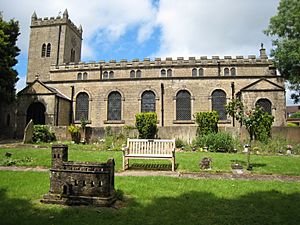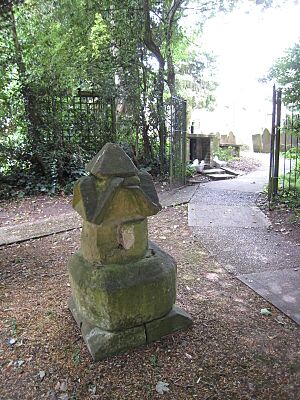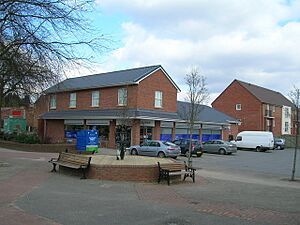Church of St Mary of the Purification, Blidworth facts for kids
Quick facts for kids St Mary's, Blidworth |
|
|---|---|
| St Mary of the Purification, Blidworth | |

With 1963 model of the earlier church in foreground
|
|
| Denomination | Church of England |
| Churchmanship | Broad Church |
| History | |
| Dedication | St Mary |
| Administration | |
| Parish | Blidworth |
| Diocese | Southwell and Nottingham |
| Province | York |
The Church of St Mary of the Purification is a special parish church in Blidworth, Nottinghamshire. It is part of the Church of England and has been around since the 15th century. This church is so old and important that it is a Grade II* listed building, which means it's protected for its historical value.
Contents
About the Church Building
Only the tall west tower from the original 15th-century church is still standing today. Most of the church you see now was built much later. Parts were added in 1739 by a builder named Rhodes from Barlborough, and more was built in 1839 by Colvin. The church is made of smooth, cut stone called ashlar and has a lead roof.
In the churchyard, there's even a small model from 1963 that shows what the older church might have looked like. The clock tower has two clocks, one facing west and the other east. This way, people approaching the church from either direction along Main Street can easily see the time.
The Church Organ
The church used to have a very old pipe organ, but it was in bad condition. So, in 2012, it was replaced with a modern electronic organ. This new organ was specially made to fit inside the old, beautifully carved wooden case. This makes it look like the original organ when you see it from the main part of the church, called the nave.
Experts, including the local music director and the main organist from Southwell Minster, helped decide what sounds the new organ should make. They wanted to make sure it sounded just right for the church's music.
Famous Burials
The Church of St Mary is believed to be the resting place of Will Scarlet, a legendary friend of Robin Hood. While the exact spot of his burial isn't known, a piece of the earlier church building now serves as a special memorial to him in the churchyard.
The Rocking Ceremony
The Church of St Mary of the Purification is unique because it's the only church known to still hold an annual Rocking Ceremony. This special event happens on the Sunday closest to Candlemas, which is around February 2nd.
During the ceremony, a baby boy who was born closest to Christmas Day is "rocked" in a cradle decorated with flowers. The baby's parents must be married and Christian, and they must live in Blidworth.
History of the Ceremony
The Rocking Ceremony is a symbolic way to remember a story from the Bible. This story, found in Luke's gospel, describes Jesus being presented at a temple when he was a baby. People think the ceremony started way back in the 13th century. However, it was banned in 1600.
The custom was brought back in 1842 by the vicar, John Lowndes, but then it stopped again. It was revived once more in 1922, and the same cradle has been used for the ceremony ever since.
All the babies who have been part of the Rocking Ceremonies have their full names and the year they were "Rocked" recorded on a special plaque at the back of St Mary's Church. In 2010, a sculpture of a cradle was made and placed in the village to celebrate this old and special tradition.
See also
- Grade II* listed buildings in Nottinghamshire
- Listed buildings in Blidworth
Images for kids
 | Calvin Brent |
 | Walter T. Bailey |
 | Martha Cassell Thompson |
 | Alberta Jeannette Cassell |





